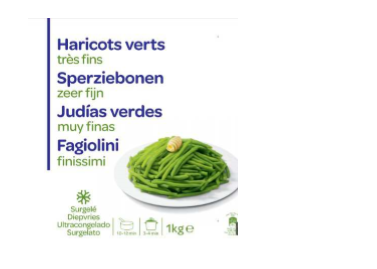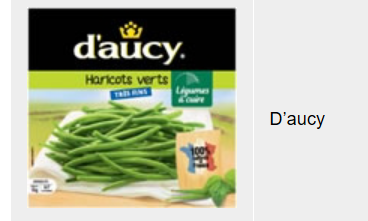Greenyard Frozen France has recalled frozen green beans because they could contain parts of a poisonous plant commonly known as jimsom weed or jimsonweed.
The scientific name of the plant is Datura stramonium and it contains high levels of tropane alkaloids including atropine, hyoscyamine and scopolamine. It is in the nightshade family of plants.
Very small quantities of alkaloids are enough to trigger intoxication that can lead, in serious cases, to being in a coma and death, according to the French Ministry of Agriculture and Food.
It is not known if anyone has become ill from the green beans, but a Rapid Alert System for Food and Feed (RASFF) alert lists the notification type as consumer complaint.

“Notre Jardin” brand green beans in 1-kilogram packages sold in France at Leclerc supermarkets with lot code 8352M dated Dec. 18, 2020, and lot code 8031M dated Jan. 31, 2020, supplied by Scamark have been recalled. Lot 8031M has been sold since February 2018 and lot 8352M since Dec. 20, 2018.
Green beans (Haricots verts in French) with no brand sold at Carrefour with lot code 8058M and 8120MX and date of “February” are also affected.
Also under recall are Cuisine de France green beans with lot codes 8026M, 8026MX and 8155MX and date of January 2020 are involved. D’aucy green beans with lot codes 8176M, 8176MX and 8205MX and best before date of June 2020 have also been recalled.

Potentially contaminated frozen green beans have also been sent to Andorra and Slovenia. In Slovenia, the “Notre Jardin” brand with lot code 8352M from E. Leclerc in Maribor is involved.
The presence of thorn-apple, also known as Datura stramonium or jimson weed, seems to have occurred at the time of harvest.
Symptoms of poisoning are tachycardia, hyperthermia, dryness of the mouth, reddening of skin, dilated pupils, incoherent speech, agitation, disorientation and hallucination. They generally occur one to four hours after ingestion and may continue for 24 to 48 hours.
Greenyard to close or sell plant linked to Listeria outbreak
Last year Greenyard’s Hungarian frozen vegetable factory was linked to a Listeria outbreak that sickened 54 people in six countries, killing 10 of them between 2015 and 2018.
Implicated frozen products were distributed to 116 countries. Some had a shelf-life until mid-2020.
The company found the cause of contamination, a persistent presence of Listeria monocytogenes in one of the freezing tunnels and closed down this tunnel at the plant. in Baja, Hungary. It restarted production in late 2018.
However, this past week Greenyard announced it would close or sell the Baja frozen plant in Hungary. As part of a restructuring plan, the firm could also cut more than 400 jobs in different countries, but primarily in its fresh division in the United Kingdom and Germany.
Greenyard confirmed it was exploring divesting its prepared division but added it would not do this for its other core divisions of fresh and frozen. Co-CEO Hein Deprez said after years of growing, it is time to consolidate.
“This year’s extremely dry summer, the recall action beginning of the summer, but in particular, the continuing market pressure have called for important decisions,” he said.
(To sign up for a free subscription to Food Safety News, click here.)

